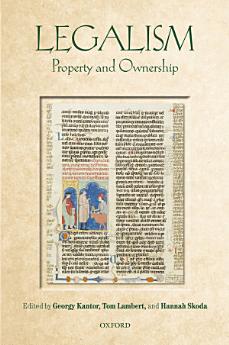Legalism: Property and Ownership
Georgy Kantor · Tom Lambert · Hannah Skoda
dic 2017 · Oxford University Press
Libro electrónico
304
Páginas
family_home
Apto
info
reportLas calificaciones y opiniones no están verificadas. Más información
Acerca de este libro electrónico
In this volume, ownership is defined as the simple fact of being able to describe something as 'mine' or 'yours', and property is distinguished as the discursive field which allows the articulation of attendant rights, relationships, and obligations. Property is often articulated through legalism as a way of thinking that appeals to rules and to generalizing concepts as a way of understanding, responding to, and managing the world around one. An Aristotelian perspective suggests that ownership is the natural state of things and a prerequisite of a true sense of self. An alternative perspective from legal theory puts law at the heart of the origins of property. However, both these points of view are problematic in a wider context, the latter because it rests heavily on Roman law. Anthropological and historical studies enable us to interrogate these assumptions. The articles here, ranging from Roman provinces to modern-day piracy in Somalia, address questions such as: How are legal property regimes intertwined with economic, moral-ethical, and political prerogatives? How far do the assumptions of the western philosophical tradition explain property and ownership in other societies? Is the 'bundle of rights' a useful way to think about property? How does legalism negotiate property relationships and interests between communities and individuals? How does the legalism of property respond to the temporalities and materialities of the objects owned? How are property regimes managed by states, and what kinds of conflicts are thus generated? Property and ownership cannot be reduced to natural rights, nor do they straightforwardly reflect power relations: the rules through which property is articulated tend to be conceptually subtle. As the fourth volume in the Legalism series, this collection draws on common themes that run throughout the first three volumes: Legalism: Anthropology and History, Legalism: Community and Justice, and Legalism: Rules and Categories consolidating them in a framework that suggests a new approach to legal concepts.
Acerca del autor
Georgy Kantor is a Fellow and Tutor in Ancient History at St John's College, Oxford. He works on Roman legal and institutional history, particularly on the eastern provinces of the Roman Empire, and on Greek and Latin inscriptions of the Roman period. He is also an associate editor of the Supplementum Epigraphicum Graecum. Tom Lambert is a Fellow in History at Sidney Sussex College, Cambridge. His publications include Law and Order in Anglo-Saxon England (2017), and he co-edited (with David Rollason), Peace and Protection in the Middle Ages (2009). His other publications range across early English legal topics, engaging with such themes as hospitality, sanctuary, legal privilege, theft, and violence. Hannah Skoda is an Associate Professor of History at the University of Oxford and a Fellow of St John's College. She is author of Medieval Violence: Physical Brutality in Northern France, c.1270- c. 1330 (2012), and co-editor (with Patrick Lantschner and Robert Shaw) of Contact and Exchange in Later Medieval Europe (2012) and (with Paul Dresch) of Legalism: Anthropology and History (2012). She has published on diverse themes of later medieval social and cultural history, and is currently working on expressions of nostalgia in the long fourteenth century.
Califica este libro electrónico
Cuéntanos lo que piensas.
Información de lectura
Smartphones y tablets
Instala la app de Google Play Libros para Android y iPad/iPhone. Como se sincroniza de manera automática con tu cuenta, te permite leer en línea o sin conexión en cualquier lugar.
Laptops y computadoras
Para escuchar audiolibros adquiridos en Google Play, usa el navegador web de tu computadora.
Lectores electrónicos y otros dispositivos
Para leer en dispositivos de tinta electrónica, como los lectores de libros electrónicos Kobo, deberás descargar un archivo y transferirlo a tu dispositivo. Sigue las instrucciones detalladas que aparecen en el Centro de ayuda para transferir los archivos a lectores de libros electrónicos compatibles.





